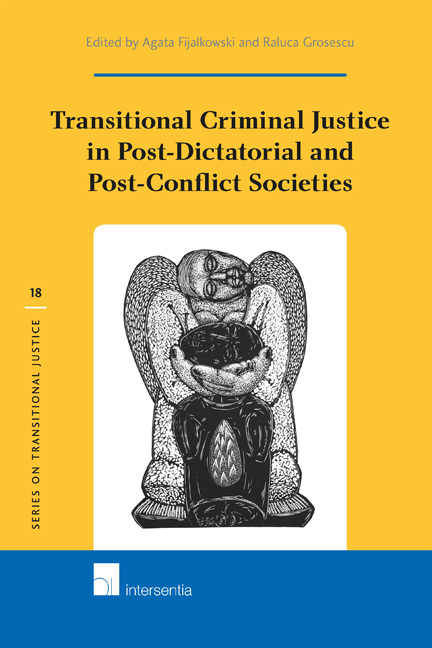Book contents
- Frontmatter
- Contents
- Introduction
- PART I CRIMINAL JUSTICE AS A METHOD OF DEALING WITH THE PAST: OPPORTUNITIES, STRATEGIES, AND LEGAL AND POLITICAL CONSTRAINTS
- Chapter 1 Retrospective Justice: Post-Communist Germany and Poland in Comparative Perspective
- Chapter 2 Transitional Justice in Nepal: Prosecutions, Reform and Accountability Strategies
- Chapter 3 Transitional Trials as History Writing: The Case of the Romanian December 1989 Events
- Chapter 4 Transitional Criminal Justice: The Polish Way
- Chapter 5 Public Contestation and Politics of Transitional Justice: Poland and Albania Compared
- Chapter 6 Consolidating Democracy Through Transitional Justice in Slovenia: Lessons Learnt?
- PART II UNIVERSAL PRINCIPLES V LOCAL PECULIARITIES: THE RELATIONSHIP BETWEEN NATIONAL JURISDICTIONS AND INTERNATIONAL LAW
- About the Authors
Chapter 5 - Public Contestation and Politics of Transitional Justice: Poland and Albania Compared
from PART I - CRIMINAL JUSTICE AS A METHOD OF DEALING WITH THE PAST: OPPORTUNITIES, STRATEGIES, AND LEGAL AND POLITICAL CONSTRAINTS
Published online by Cambridge University Press: 28 November 2017
- Frontmatter
- Contents
- Introduction
- PART I CRIMINAL JUSTICE AS A METHOD OF DEALING WITH THE PAST: OPPORTUNITIES, STRATEGIES, AND LEGAL AND POLITICAL CONSTRAINTS
- Chapter 1 Retrospective Justice: Post-Communist Germany and Poland in Comparative Perspective
- Chapter 2 Transitional Justice in Nepal: Prosecutions, Reform and Accountability Strategies
- Chapter 3 Transitional Trials as History Writing: The Case of the Romanian December 1989 Events
- Chapter 4 Transitional Criminal Justice: The Polish Way
- Chapter 5 Public Contestation and Politics of Transitional Justice: Poland and Albania Compared
- Chapter 6 Consolidating Democracy Through Transitional Justice in Slovenia: Lessons Learnt?
- PART II UNIVERSAL PRINCIPLES V LOCAL PECULIARITIES: THE RELATIONSHIP BETWEEN NATIONAL JURISDICTIONS AND INTERNATIONAL LAW
- About the Authors
Summary
This chapter explores the role of public debates in explaining the success of transitional justice after Communism. Our analysis of Albania and Poland allows a variety of both explanatory factors and results. The two cases feature different political actors who have picked up the issue of transitional justice and made it a part of the political contest, but they have also opted for dissimilar models and had various degrees of success in dealing with the past. The comparison of the two states follows a similar structure, proceeding from the actors involved and the unfolding debates, to the analysis of the models adopted, and the process of implementation in each of our cases. Our analysis suggests that both cases of transitional justice have succumbed to the weight of political interests of groups and individuals with sufficient power to negotiate new rules in the post-Communist polity. Yet the existence of a varied and concentrated public contestation among various actors proved important in restraining particular political strategies and usage of transitional justice at the service of narrow political agendas in Poland. The debate in Albania was, by contrast, monopolised by few anti-Communist forces, which proved able to push forward the issue when it was deemed beneficial for their own political agendas.
INTRODUCTION
Societies coming out of Communist repression have experienced a broad quest to ensure transitional justice for the crimes of the past. The rationale and aims of transitional justice have revolved around both normative demands to reveal the truth and get justice for Communist wrongs, but also more the pragmatic concerns of getting rid of former Communist legacies and founding a new democratic order free of remnants of the past. The urge for justice was arguably proportional to the degree of past abuses - countries that experienced harsher regimes demand a severe line of justice, whereas those under liberalised forms of Communism are be more inclined to tolerate former abuses and embrace moderate models. Dominant explanations that capitalise on the role of historical factors, be it the type of Communist regime or timely liberalisation, can often fail to explain the variety of models and results of pursuing transitional justice across the post-Communist world.
- Type
- Chapter
- Information
- Publisher: IntersentiaPrint publication year: 2015

